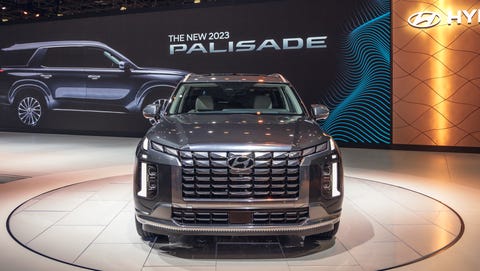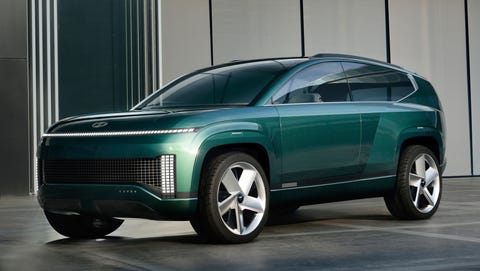
Twenty years ago, Hyundai was known for bland, cheap A-to-B transport. It would have been hard to imagine that the company would ever build a reputation for creative and stylish vehicles. But with bold designs like the 2023 Palisade and the retro-futuristic Ioniq 5, Hyundai has now become a design leader. We spoke with Hyundai’s design chief, SangYup Lee, at the New York auto show and he gave us insight into the company’s current and future design philosophy.
Hyundai has established its eye-catching style with large grilles that dominate the faces of its gas-powered models. While some of these grilles, like the gaping maws on the Sonata and Santa Fe, have made the vehicles look like hungry catfish, Hyundai hit a home run with the armor-like grilles on its 2022 Tucson and Santa Cruz. Both models disguise the daytime running lights as part of the grille—which Hyundai calls the “hidden jewel” design—and Lee said positive feedback on the Tucson prompted the grille design to spread to the 2023 Palisade. “This is a very unique characteristic so we want to really capitalize and make a statement,” he explained.
At the same time, Hyundai has managed to create a sharp and easily identifiable EV lineup without relying on the same design element. “In the EV era, the grille is no longer needed,” Lee said. “Having a traditional ICE element carry to future, that’s probably not the right move.” Instead, Lee says “the light signature is more important than the grille shape,” and one look at the Ioniq 5 shows that’s the case. The 5 was the debut for the pixel graphic, which will spread across the Ioniq lineup and gives off an ’80s video game vibe while still looking fresh and futuristic. We’ve already seen the pixels appear on the Prophecy concept, which previews the upcoming Ioniq 6, and the Seven concept, which will become the Ioniq 7 in 2024. “None of them have a grille, but the consistency is the pixel lamp,” Lee said. “When you see pixel lamp, it’s a Hyundai.” While other automakers—namely BMW, Mercedes, and Audi—have included fake grilles on their EVs, Hyundai won’t as long as Lee is in charge.
Before working at Hyundai, Lee designed for General Motors and the Volkswagen Group, penning stunning cars like the 2006 Camaro concept. While Lee enjoyed his time at those manufacturers, he said working at Hyundai has been a breath of fresh air. “Bentley’s legacy is unbelievable,” he said. “But this weight from the legacy on your shoulders is quite heavy, so when you do the sketch you ask, is this Bentley enough?
“With Hyundai you have more freedom,” he said, since the South Korean brand doesn’t have nearly as fixed a design lineage. Lee sees his time at Hyundai as an opportunity to write history: “What you’re doing is part of what will become the brand legacy.” Hyundai’s approach is also far more consumer focused, which Lee likes. “Sometimes I spend hours at the Costco parking lot, studying how the customer reacts to the car, how Mom puts her baby in the back seat, how they load stuff in the tailgate,” he said. “That’s the inspiration.”
This freedom from a design legacy at Hyundai is enhanced by lack of constraints when designing electric cars. While gas car designs are restricted by their powertrain and chassis, “the EV skateboard platform gives us a lot more freedom.” This allows for the blurring of traditional automotive segments; the Ioniq 5 is a prime example, its hatchback proportions belying the car’s SUV size and 118.1-inch wheelbase. Lee did make a worrying comment that the future “might be all boxes with interior space,” but at least for now, Hyundai will continue with the two-box design, with Lee promising “all of our Ioniq EVs will have the longest wheelbase in the market.”
These stretched wheelbases open up lots of possibilities. Lee said he had recently been in South Korea and had seen an Ioniq 5 in an apartment parking lot. “There was a father and a son and they put a small desk behind the front seats and were studying together in the car,” he said. “Probably they both got kicked out by Mom,” he joked, but the Ioniq 5 was effectively adding another room to their apartment. “This space revolution is the key for the EV,” Lee concluded. “How you utilize this space is an open chapter for designers.”
This content is created and maintained by a third party, and imported onto this page to help users provide their email addresses. You may be able to find more information about this and similar content at piano.io
#Hyundai #Design #Chief #SangYup #Lee #Companys #Design #Future
Source link







